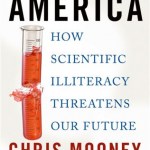Journalism
Wow. Here's another inexcusable case of bad science journalism - one that clearly has political motives. This is the lede from a story by Amanda Carpenter in this morning's Washington Times:
President Obama's top science adviser has toyed with extreme measures of population control, even suggesting in one book how to make it more publicly acceptable for the government to spike drinking water in order to sterilize people.
Wow! That would be quite a shocker - if it were true.
Honestly, this "news" article goes off the rails so hard in its first paragraph, I barely know where to start! First…
In Chris Mooney and Sheril Kirshenbaum's newly released book, Unscientific America: How Scientific Illiteracy Threatens our Future, they roundly condemn ScienceBlogger PZ Myers and other "New Atheists" for their uncompromising stance against religion. When PZ, in return, posted a scathing review of the book on Pharyngula—calling it a "hypocritical and ignorant paean to mealy-mouthedness" and "utterly useless"—a vehement debate was launched across the blogosphere. PZ and others claimed that the authors misrepresent the doctrines they attack in the book, and that by attributing a public…
Earlier, I blogged about the seriously flawed Telegraph article about rape. Now Carl Zimmer has discovered that the newspaper has yanked the article from its site. No explanation, no apology - it's just gone.
I feel silly that I didn't grab a screencapture of the original article. Although I'm aware that nothing is immutable on the Internet, it just didn't occur to me that someone would yank a published article from a newspaper with no explanation. I guess we have to think of online newspapers as unreliable AND impermanent. Ephemeral, in fact - just like the real, pulpy, newsprint-smudgy…
Ed Yong, echoed by Mike the Mad biologist PhysioProf asks what the heck investigative science journalism would look like. I hope to write more extensively on this soon. In the meantime, a few observations:
To ponder this question -- and to do investigative reporting -- I think it helps to have a sense of the history of science, which embeds in a writer or observer a sense of critical distance and an eye for large forces at work beneath the surface. Machinations in government surprise no one who has studied the history of government and politics. Likewise with science.
Science -- the search…
No, this isn't another "How dare those journalists muddle the explanation of some scientific topic" post. The concept here is journalism itself, as seen in Ed Yong's discussion of different modes of science journalism. Writing about the recent World Conference of Science Journalists, he talks about some controversy over what "science journalism" actually means:
Certainly, the idea that journalism equated to talking or writing about science in any form was unpopular. In the opening plenary, Fiona Fox drew a fine line between science communication and journalism, the latter characterised…
The recent World Conference of Science Journalists included a wide variety of delegates, from professional hacks who cover science beats, to enthusiastic freelancers and bloggers like me, to people working in press offices and communications departments. And with such diversity, it was perhaps inevitable that people should discuss which of these gathered attendees actually counted as journalists? And what exactly does science journalism entail?
Certainly, the idea that journalism equated to talking or writing about science in any form was unpopular. In the opening plenary, Fiona Fox drew a…
Wow. . . coming off the Silence is the Enemy rape awareness initiative, it's more depressing than usual to see the Telegraph's latest bad science reporting. Their story implies that rape victims deserve blame for what happens to them:
Women who drink alcohol, wear short skirts and are outgoing are more likely to be raped, claim scientists at the University of Leicester (source).
Ben Goldacre of the excellent Bad Science blog didn't think so. So he tracked down the (student) author of the (unpublished) (MS) dissertation cited by the Telegraph. She said the article was completely wrong:
"We…
One of the highlights of the World Conference of Science Journalists was the final day's heated debate about embargoes. For newcomers to the issue, journalists are often given press alerts about new papers before they are made publicly available, on the understanding that they aren't reported before a certain deadline - the infamous embargo. This is why so much science news magically appears at simultaneously across news outlets. All the major journals (and many minor ones) do this with their papers, as increasingly do universities and other research institutions.
Vincent Kiernan (who has…
It's been 26 years since health-care reform failed. Does the debate reflect anything that's happened since?
From The Columbia Journalism Review:
"The idea that we've made a great breakthrough just isn't so," says Jonathan Oberlander, a health-policy expert at the University of North Carolina. "Most of the plans today are direct descendants of what was proposed for the '93-'94 debate. The debate reminds me of one of my favorite movies, Groundhog Day.
With few exceptions, like the fine series last summer by NPR that explained how a number of other countries handle health care, the press has…
What a night.
Tonight, during the gala dinner of the World Conference of Science Journalists, I won the Association of British Science Writers' award for Best Newcomer 2009, collecting a certificate, an award and prize money in the Natural History Museum's central hall. In front of me: hundreds of international science journalists and Dippy the Diplodocus. Behind me: a statue of Charles Darwin. If that isn't reward for efforts in writing about science, I don't know what is.
Anyway, the award was a result of popular vote from members of the ABSW, so my heartiest thanks to anyone and…
I no longer recall who pointed me to this current.com post titled "Scientists Make Radio Waves Travel Faster Than Light "-- somebody on Facebook, I think. As it would be a pretty neat trick to make light move faster than light, I took a look. The opening is fairly standard semi-gibberish:
Scientist John Singleton insists that Albert Einstein wouldn't be mad at him, even though at first blush Singleton appears to have twisted the famous physicist's theories about light into a pretzel.
Most people think Einstein said that nothing can travel faster than the speed of light, but that's not really…
Nick Davies is one of the most interesting figures in UK journalism, not least because of the publication of his excellent book Flat Earth News. On his website, he describes the book as "[taking] the lid off newspapers and broadcasters, exposing the mechanics of falsehood, distortion and propaganda; naming names and telling the stories behind stories."
In a superb session, Davies (ably interviewed by Jeremy Webb of New Scientist) set out his thesis about the broken state of science journalism, littered with pithy turns of phrase and good-natured storytelling.
Davies's key assertion is that…
Last Friday, in my post on Nature's comprehensive coverage of science journalism, I mentioned the recent Nature Biotechnology conference paper on science communications co-authored by scibling Matt Nisbet. I also said I'd come back to one of the points in it that bothers me.
As I said yesterday, most of the material in this paper (the issues of media fragmentation, framing problems, incidental exposure, etc.) has been expressed elsewhere. I agree with the majority of it, and it's nice to see it all in one place. But I have to take exception to a small piece of the paper - an example that I've…
In the opening salvo of the World Conference of Science Journalists, three speakers debated the role of new media in the science journalism of tomorrow. What follows is an account of the session and personal opinions on some of the issues raised.
How online news can evolve (and have blogs and other media already beaten it there?)
Krishna Bharat, founder of Google News and owner of the incredible job title of "Distinguished Researcher", kicked things off with a whirlwind tour of ideas on the future of online news. He touched on each one for the briefest of moments:
He highlighted Google…
For the next three days, I will be at the World Conference of Science Journalists live-tweeting the sessions I'm attending. The talks so far have been excellent but so far, the live-tweeting experience has been a revelation. I have Word open on the right of my screen for note-taking and Tweetdeck on the left for tweeting and collating what others are saying with the #wcsj hashtag. I was initially very sceptical of doing this but the perks have been numerous.
Most of all, it's a strangely exhilarating experience to hear what other people think and respond to while the talks are actually…
John Timmer at Ars Technica discusses the results of a survey of bloggers which seems to suggest that, while most bloggers hold themselves to a reasonably high ethical standard, they don't necessarily expect other bloggers to do so.
I think it's kind of a weird idea to have a code of ethics for all bloggers, but that's because blogs are so diverse, not because I can imagine a situation in which I'd be deliberately violating such a code. My blog is a sort of mashup of art review, musings on communications and policies, and science coverage, and they're all different sorts of posts. When I blog…
One of the fun thing about being at home for a weekend is that I get to see a close-up view of the death of the American newspaper. When I was a kid, Binghamton had two daily papers, the Sun-Bulletin and the Evening Press, published in the morning and evening, respectively (bet you couldn't've guessed that). They merged into the Press and Sun-Bulletin in the early 80's, and ave been declining ever since. These days, it takes about fifteen minutes to read the whole thing cover to cover. Twenty on Sunday.
Today's edition, though, includes a story on self-publishing, which is a sad reminder that…
This may be the best BBC story EVER. Seriously:
Australian wallabies are eating opium poppies and creating crop circles as they hop around "as high as a kite", a government official has said."We have a problem with wallabies entering poppy fields, getting as high as a kite and going around in circles," Lara Giddings told the hearing. "Then they crash," she added. "We see crop circles in the poppy industry from wallabies that are high."
I have nothing to add. At a complete loss here. I can't even come up with a bad pun.
PS - Oops, I forgot to say this was courtesy of reader Jake! Thanks Jake…
Nature has gone science journalism crazy, with no less than six new articles on the subject! My favorite is "Science Journalism: Toppling the Priesthood," by Toby Murcott, who argues that coverage of peer review is a necessary component of truly investigative, accurate science journalism.
I don't agree with everything Murcott says, but he makes some really good points:
Journalism is often described as history's first draft. Much contemporary science journalism, however, can be seen as a second, or even a third draft. Unlike reporters covering other fields of public life, science journalists…
A wag of my finger at the Corporate Masters, for their new article about traffic jams, with the subhead "For particle physicists who study phase transitions, a traffic jam is simply a solid made up of idling cars." In the body of the article, we find:
While the concept of critical density has been repeatedly demonstrated using computer simulations--drivers are surprisingly easy to model as a system of interacting particles--it wasn't until last year that this theory of traffic was experimentally confirmed. A team of physicists at Nagoya University wanted to see how many cars could maintain a…

